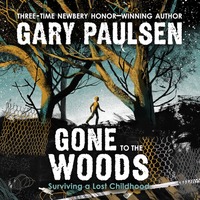Take a photo of a barcode or cover
dark
emotional
reflective
sad
medium-paced
Gary Paulsen writes about his early childhood growing up with an absentee, drunk mother. He spends time learning to love the woods and farming with his great aunt and uncle before being reclaimed by his mother and dodging the violent tempers of his alcoholic parents. Finally, he joins the military to escape his bleak future and he learns to love the written word.
I was shocked at what Gary Paulsen had to go through as a child. I appreciated the semi-removed nature of the writing, but it felt clunky at times. He also skipped over large periods of time, which made it occasionally hard to follow, but overall I enjoyed it.
I was shocked at what Gary Paulsen had to go through as a child. I appreciated the semi-removed nature of the writing, but it felt clunky at times. He also skipped over large periods of time, which made it occasionally hard to follow, but overall I enjoyed it.
This book!
The honesty, lyricism and glimpse into a truly hard life during a vastly different time were mesmerizing. I've not read a physical book so quickly in some time.
I adore Edy and Sig. I adore little Gary, so observant and open-hearted. Reading about the way he experienced the beauty of the woods, and was forever changed by it, changed me.
The chapter titled The Librarian in Section IV made me weep--that's what a library is and can be! That's how lives actually change! The wisdom, sensitivity, and patience of that unnamed woman simply moved me. As I consider her now, I'm so very grateful she saw--and nurtured!--the boy.
And I hurt for him and the terrors he saw and lived through. His intentional, deliberate choices about what he wanted to do with his life felt genuinely courageous. I also recognized some learning differences which helped me relate to him more.
There's something about the way Paulsen writes. He uses English and imagery just differently enough that for me, it cuts through and communicates on a different, more vulnerable level. It gets in under the barrier of language to a quieter, less often considered, layer. It's like going back to seeing with a child's eyes--not an ignorant, blissful child, but a dreadfully wise one who paid for their wisdom far too early.
The honesty, lyricism and glimpse into a truly hard life during a vastly different time were mesmerizing. I've not read a physical book so quickly in some time.
I adore Edy and Sig. I adore little Gary, so observant and open-hearted. Reading about the way he experienced the beauty of the woods, and was forever changed by it, changed me.
The chapter titled The Librarian in Section IV made me weep--that's what a library is and can be! That's how lives actually change! The wisdom, sensitivity, and patience of that unnamed woman simply moved me. As I consider her now, I'm so very grateful she saw--and nurtured!--the boy.
And I hurt for him and the terrors he saw and lived through. His intentional, deliberate choices about what he wanted to do with his life felt genuinely courageous. I also recognized some learning differences which helped me relate to him more.
There's something about the way Paulsen writes. He uses English and imagery just differently enough that for me, it cuts through and communicates on a different, more vulnerable level. It gets in under the barrier of language to a quieter, less often considered, layer. It's like going back to seeing with a child's eyes--not an ignorant, blissful child, but a dreadfully wise one who paid for their wisdom far too early.
I loved this memoir! Written in a narrative style where he does not use his name but rather uses "the boy", to reveal a past that is very painful. Paulsen through his writing and speaking has always been open about his difficult upbringing and I was aware of the importance that a librarian had in opening up literature and writing to him, but I was not prepared for the depth of horror that he experienced at such a young age. It is no wonder that he went on to be able to write survivalist literature that was so engaging and impactful for middle grade readers.
I devoured this book and it broke my heart to read about the mistreatment and neglect of a child. Be prepared, it is not an easy read and some of the situations he writes about are horrific. Not that he adds unnecessary details or adds gory graphic details, but rather that a child actually had to see those images and process them alone. I highly recommend for mature middle grade readers and anyone who grew up enjoying Paulsen's work.
**When I book talk this one, I need to remember to read the section on pg. 296 when he and the librarian talk about the first book checked out with his library card, as it was just beautiful! Here is the ending of that section, "She was listening. Actually listening to him. He shook his head. 'not exactly. But the book made me think of things I'd seen when I was a kid in Manilla. It was like...an opening. Like the book opened my brain to let it see word-pictures somehow.'
He heard her make a small sound - a soft sound - a soft but sudden breath. And he saw her lower lip quiver a tiny bit and she bit it with her front teeth to stop the quivering. Her eyes misted and he thought, God, she's going to cry. But she didn't. Not quite. Instead she said: 'Isn't that wonderful?'
I devoured this book and it broke my heart to read about the mistreatment and neglect of a child. Be prepared, it is not an easy read and some of the situations he writes about are horrific. Not that he adds unnecessary details or adds gory graphic details, but rather that a child actually had to see those images and process them alone. I highly recommend for mature middle grade readers and anyone who grew up enjoying Paulsen's work.
**When I book talk this one, I need to remember to read the section on pg. 296 when he and the librarian talk about the first book checked out with his library card, as it was just beautiful! Here is the ending of that section, "She was listening. Actually listening to him. He shook his head. 'not exactly. But the book made me think of things I'd seen when I was a kid in Manilla. It was like...an opening. Like the book opened my brain to let it see word-pictures somehow.'
He heard her make a small sound - a soft sound - a soft but sudden breath. And he saw her lower lip quiver a tiny bit and she bit it with her front teeth to stop the quivering. Her eyes misted and he thought, God, she's going to cry. But she didn't. Not quite. Instead she said: 'Isn't that wonderful?'
sad
medium-paced
I read this for a book club. When I was about 100 pages from the end, I realized I wouldn't be able to go to the meeting so I decided to not finish seeing I really didn't think it was that good. But being that close to the end, I relented and decided to finish. I'm glad I did because I wouldn't have wanted to miss the part about the librarian.
At first, I thought Paulsen's writing was very beautiful and descriptive but as I read on, I thought many descriptions were very overdone. At times I would say that many passages were burdensome to read.
My next comment will, I'm sure, get eye rolls from many who read this review. It's just me but the many descriptions of killing, preparing and eating small critters was a real turnoff. At least eating them was done for the honest need of food and humans have been doing this since forever. But I don't have to hear about it. There was no killing for sport and the author even describes a thoughtless killing by what he called a "drunken hunter" as a very sad thing, feeling real passion for the dead animal. So at least Paulsen does understand the beauty of nature and for the most part, fully explains many times his appreciation of nature.
All that said, I didn't dislike the book. When I got the the end, which was very poignant, looking back on the author's life felt very epic to me.
So, although I would not recommend the book, except for my caveats, I can see how most people have liked it.
At first, I thought Paulsen's writing was very beautiful and descriptive but as I read on, I thought many descriptions were very overdone. At times I would say that many passages were burdensome to read.
My next comment will, I'm sure, get eye rolls from many who read this review. It's just me but the many descriptions of killing, preparing and eating small critters was a real turnoff. At least eating them was done for the honest need of food and humans have been doing this since forever. But I don't have to hear about it. There was no killing for sport and the author even describes a thoughtless killing by what he called a "drunken hunter" as a very sad thing, feeling real passion for the dead animal. So at least Paulsen does understand the beauty of nature and for the most part, fully explains many times his appreciation of nature.
All that said, I didn't dislike the book. When I got the the end, which was very poignant, looking back on the author's life felt very epic to me.
So, although I would not recommend the book, except for my caveats, I can see how most people have liked it.
Graphic: Adult/minor relationship, Animal death
Moderate: Abandonment
I'm not usually the intended audience for Gary Paulsen's books, but this memoir about surviving his childhood was a keeper for me. I had no idea how hard he had it as a kid. Reading about his experiences was emotional (but, you know, in a “boy surviving in the wilderness” kind of way) without being overwhelming or too graphic for most upper middle grade readers. (Yes, there was some mature content, but Gary was exposed to it at quite a young age, so he doesn’t glamorize it or tell it in a sensational way. If anything, I thought the last chapter about joining the army at 17 was the only part that was too much for a 10 year old reader.
There was even a chapter about a librarian, but I liked the book way before I got to that.
There was even a chapter about a librarian, but I liked the book way before I got to that.
Read this as my 5th grade class is a fan of the author. I wanted to ensure it was appropriate for the group, but it is a bit too dark and better left to middle school or older. Great read though!
This is a tough read (abuse). It’s a biography, but the author is very detached from himself, calling himself “the boy” throughout and barely naming any people. It’s amazing that he survived it.
An incredible story of resilience and forgiveness. Fans of Paulsen's non-fiction and fiction will be drawn to this middle school memoir.




